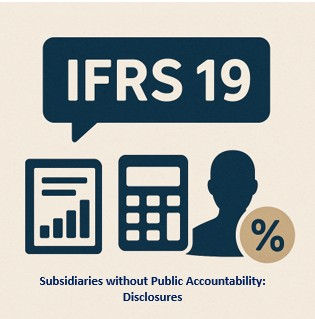IFRS 19- Subsidiaries without Public Accountability: Disclosures
- Dee S Kothari
- Jul 23
- 4 min read

Background:
The purpose behind IFRS 19 is to streamline reporting where subsidiaries often had to maintain dual accounting records, one for local statutory reporting and another for group IFRS reporting. IFRS 19 eliminates this by allowing subsidiaries (providing they use local GAAP akin to IFRS principles) that use the same recognition and measurement rules as their parent, but with reduced disclosures. Preparing full IFRS disclosures can be costly and time-consuming, especially for entities whose financial statements are not used by public investors- IFRS 19 cuts down on unnecessary effort. The standard targets users of subsidiary financial statements who typically care more about short-term cash flows, solvency and liquidity than about disclosures designed for capital market participants. It also aligns with the broader Disclosure Initiative by the IASB, which aims to make financial statements more relevant and less cluttered. IFRS 19 (Subsidiaries without Public Accountability: Disclosures) is a voluntary IFRS Accounting Standard, issued by the IASB in May 2024, which enables eligible subsidiaries to prepare IFRS-compliant statements with materially reduced disclosure requirements.
The standard is effective for annual periods beginning on or after 1 January 2027, with early adoption permitted.
Objective and Key Features
Reduced Disclosure Burden
IFRS 19 allows eligible subsidiaries to follow the recognition, measurement and presentation rules of other IFRS Standards—but substitute those standards’ full disclosures with a streamlined disclosure set under IFRS 19.
Eligibility Criteria
A subsidiary may adopt IFRS 19 if, at the reporting date;
If it is classed as a subsidiary under IFRS 10;
Does not have public accountability; and
Its parent company produces consolidated financial statements under IFRS and makes them publicly available.
This applies in both separate and consolidated financial statements and covers both annual and interim reporting.
Benefits to Eligible Subsidiaries
IFRS 19 brings several advantages:
Reduced effort and cost by eliminating extensive disclosures—e.g. IFRS 12 disclosures may shrink in practice.
Avoids dual accounting records, subsidiaries need not maintain separate local GAAP and IFRS sets if group reporting already uses IFRS.
Lower audit and reporting costs, given fewer disclosures and less reconciliation work.
This standard is particularly beneficial for subsidiaries in sectors like technology, real estate, consumer goods, industrials and financial services- where public accountability is limited.
Transition, Amendments & Jurisdictional Adoption
When issued, IFRS 19 included reduced disclosures only for IFRS standards issued up to 28 February 2021. Disclosure changes introduced between then and May 2024 were included in full, without reduction.
An Exposure Draft released in July 2024 proposed extending reduced disclosure principles to those later standards. The IASB expects the final amendments to align with IFRS 19's effective date.
EU and UK Endorsement Status
In the European Union, EFRAG issued a draft endorsement advice in May 2025, assessing disclosure differences and cost‑benefit impact. Public comments were invited until 3 September 2025.
In the United Kingdom, the UK Endorsement Board (UKEB) is in the pre‑endorsement phase, planning to consider IFRS 19 and its amendments together. An updated project plan was issued in July 2025.
Until endorsement, UK subsidiaries cannot adopt IFRS 19 but must consider interactions with FRS 101 (UK reduced disclosure framework) and the Companies Act 2006.
Practical Implications for Groups
Eligible subsidiaries that currently prepare financial statements under local GAAP or IFRS for SMEs may switch to using parent company’s IFRS accounting policies—thus eliminating the need for dual recordkeeping.
However, initial transition costs may include:
Internal review of existing vs reduced disclosure requirements;
Adjustment of reporting systems; and
Ensuring comparator information for prior periods is disclosed if early adoption is used.
Key Takeaways
Effective Date | From 1 Jan 2027; early adoption allowed. IFRS 19 permits disclosure of prior-period info when early adopting. |
Scope | Subsidiaries without public accountability with IFRS-reporting parent |
Core Benefit | Same recognition/measurement; fewer disclosures |
Disclosure Reduction | Substitutes industry-standard disclosures with a compact IFRS 19 version |
Maintenance | Amended whenever other IFRSs revise disclosure requirements |
Jurisdictional Status | Under endorsement in EU/UK; adoption pending review |
Next steps
IFRS 19 represents a meaningful simplification for eligible subsidiaries preparing IFRS statements, streamlining disclosures without compromising financial information quality. Effective from 1 January 2027, with early adoption possible, it is an important strategic consideration for multinational groups seeking efficiency¹.
Dee Singh Kothari is a senior partner in Kothari Partners
¹ If your entity qualifies, Kothari Partners can help unlock significant reporting cost and complexity reductions ahead of adoption, via.
1. Assessing eligibility: confirm subsidiary status and lack of public accountability.
2. Monitor jurisdictional endorsement—especially for EU or UK entities.
3. Compare current disclosures with proposed IFRS 19 disclosures; and assess expected savings.
4. Plan transition steps for systems, accounting policies and audit approaches.
5. Train staff on the reduced disclosure content and how it maps back to full-IFRS reporting.
At Kothari Partners, our approach is to help our clients understand their current situation, identify the value and decide on the scope, vision and set of strategies for what they could achieve for their business. We help plan their implementation and support them and deliver the solution/ change needed, so it is properly and permanently embedded in their organisation.
We aim to help past and future clients by delivering high-quality work to their organisation, generate real efficiencies and free up time to support better business decisions.
For a confidential discussion please free to contact us, via our corporate website: https://www.KothariPartners.com







Comments